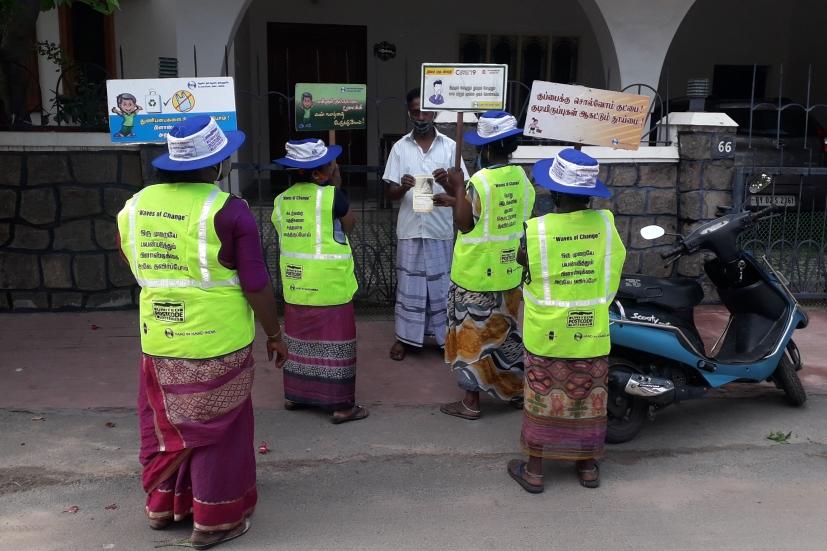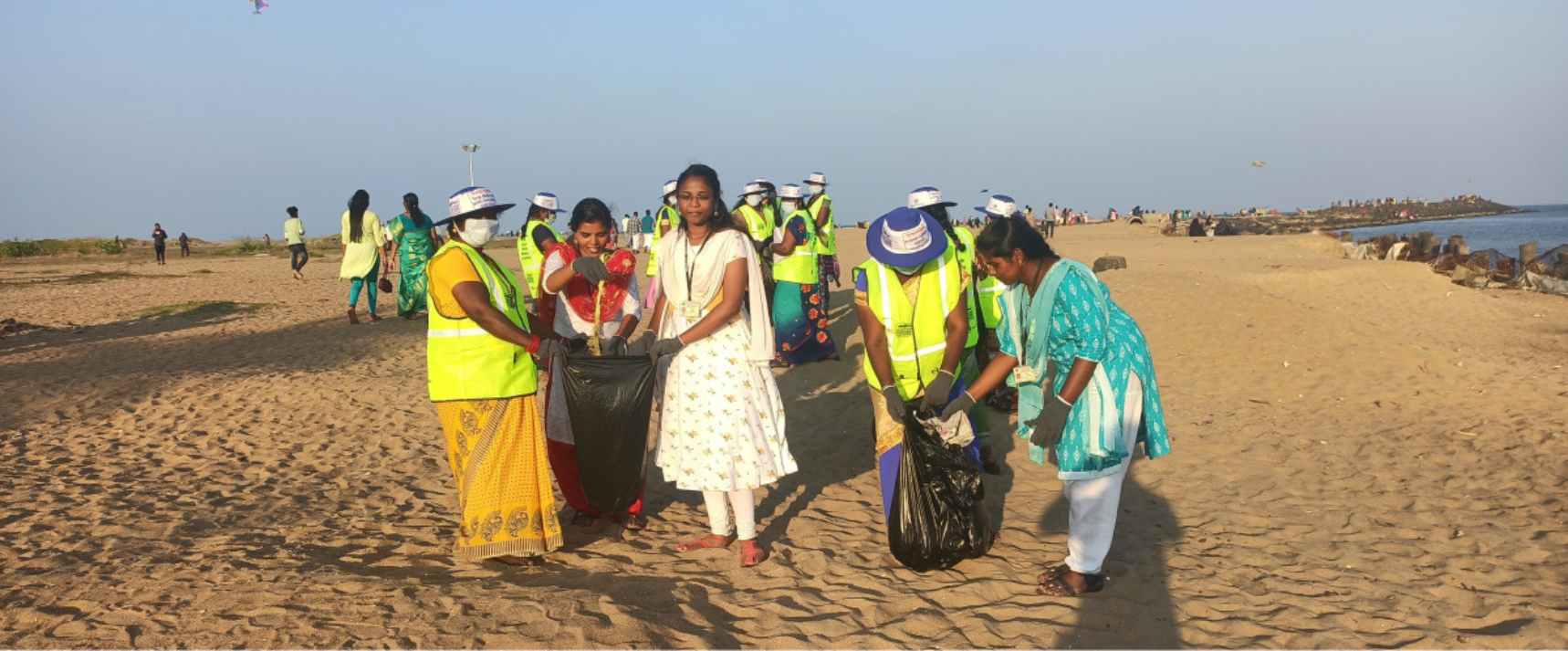Working Hand in Hand with Communities to Reset Behaviour
Imagine you live in a coastal town, sunny and bright with the soothing sound of waves reverberating at your doorstep. Now imagine, you walked to the beach and you were greeted by 33 dead turtles?
This is a true story that the residents and beach-goers of Karaikalmedu and Kilinjalmedu witnessed in Karaikal Municipality, located in the Union Territory of Puducherry, India. The reasons are multiple – abundance of plastic fishing nets abandoned by trawlers, plastic waste generated by tourists drifting in the coastal waters where these turtles reside, and hazardous water from land that mixes with seawater at estuaries.
Climate change is a direct outcome of human behaviour and actions. And the very same humans, as conscientious decision makers, can bring about a difference through daily actions and affirmations.
To maintain a balance in the ecosystem, avoid further destruction in the environment and prevent overconsumption of natural resources, we value resetting behaviour a key part of our community engagement at Hand in Hand India. We believe that every individual has the potential to create a ripple effect for sustainable change. We curate campaigns and communication material based on the mindsets and needs of different target groups to ensure they are convinced of the messaging. This process takes time, so our initiatives are usually long term with active community participation.
Start Them Young
Some habits stick longer than others. Especially if they are taught early on. In line with this, we work with school children to train their mindsets towards sustainable decisions, keeping in mind their impact on the environment.
We conduct training camps at our solid waste management projects’ resource recovery parks (large areas where we segregate solid waste and ensure proper treatment/disposal of the same) for school students. We provide live examples of how waste is segregated and disposed of, and what happens if segregation is not done appropriately in their homes. These young minds imbibe the concept like sponges and take the messages back home and to their parents.
Even during the pandemic, with the support of CSR partners, we conducted online training for students on different topics like waste management, energy efficiency, water conservation, soil health, etc. The online training is followed up with project work, with students having to come up with innovative ideas applying these concepts and present it to their classmates. Prizes are distributed and the concepts implemented too.
An interesting example of how this programme has made an impression is at Pudukkottai in Tamil Nadu. The resource recovery park there has a lot of plants in upcycled pots, which happens to be along a route to the local school. One day, our team saw three school girls watering the plants on the way home from school. This surprised onlookers as they were young and so conscientious–an outcome of the training given to them on the importance of nurturing plants and greenery.

A Message a Day
How impactful is an ad in the newspaper you see every day or a billboard on your way to work? If the visuals are catchy, there will be some memory of the brand name. As such, we decided to start a unique “A Message a Day” campaign. Clad in fluorescent jackets and wide-brimmed hats, our dignified sanitary workers, called Green Friends, were seen bustling about town one day. Each of their jackets had a message related to the broad theme of environmental conservation, while they repeated messages about simple actions to take to the residents they serve all day, such as “Avoid using single-use plastics'', “Do not litter” or “Keep the coast and beaches clean”. This simple reiteration of the message every week created a memory loop among the residents, encouraging them to inculcate these habits in their day-to-day life!
Community Engagement Activities
The concept of community goes a long way in bringing about change in mindsets. It provides an opportunity to engage young and old alike. Our ‘Waste Carnivals’ are an example of this.
As the name suggests, we bring together the community to participate in events such as competitions on thematic wall painting and rangoli (colourful floor drawings typically found in front of households) with slogans. We hold teaser campaigns, street theatre and mobile auto campaigns.
Each of these tickles a different sense of the human mind and supports effective recall. For example, the colourful rangolis are not merely a feast for the eyes but must be thought through by the teams in terms of their impact based on the theme. The audio campaigns use music as a tool to pass on messages related to proper consumer behaviour. Teaser campaigns have cryptic messages placed in locations all over the community for a week, leaving people guessing and curious!
Community-based events also provide an opportunity for like-minded people to pledge to make a difference together rather than at an individual level. For example, a group of 12 women from a self-help group at Karaikal have come together to voluntarily run a coastal Litter Picking campaign and managed to collect 300 kg of single-use plastic bags, cups, glass bottles, polystyrene, and discarded plastic nets in just one morning! This has now become a weekly activity – taking responsibility for human action.
Wondering what happened to the turtles at Karaikal? We used this incident to sensitise the locals and transform them into model responsible citizens. Through awareness programmes, the village of 2,500 pledged to avoid single-use plastics and keep the beaches clean henceforth. This resolution was also communicated to all tourists and beach-goers.
Whether it is big cities or rural towns, climate change is impacting livelihoods, lifestyles and access to basic amenities. Behavioral change is slow but evident. In our Karaikal project, we have convinced about 56% households to segregate waste out of the 25,000 households over a period of five years through continuous sensitisation activities. Over a period of one year, we can bring about around 10 per cent change towards sustainable habits. Sustained efforts, continuous innovation and reiteration of messages remain the way forward!





